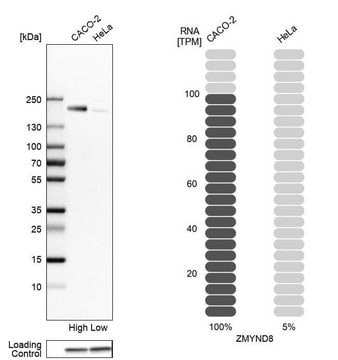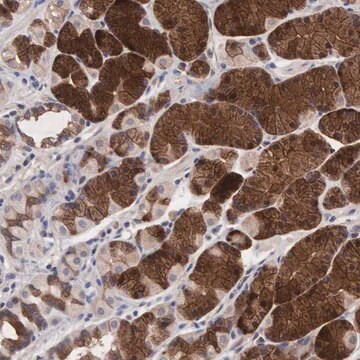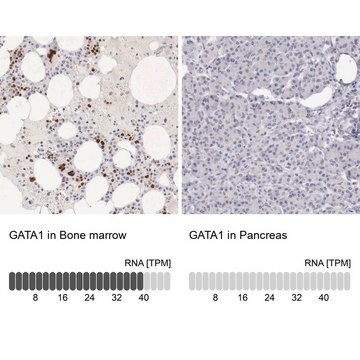HPA000166
Anti-DKC1 antibody produced in rabbit
Ab1, Prestige Antibodies® Powered by Atlas Antibodies, affinity isolated antibody, buffered aqueous glycerol solution
Synonym(s):
Anti-CBF5 homolog antibody produced in rabbit, Anti-Dyskerin antibody produced in rabbit, Anti-H/ACA ribonucleoprotein complex subunit 4 antibody produced in rabbit, Anti-Nopp140-associated protein of 57 kDa antibody produced in rabbit, Anti-Nucleolar protein NAP57 antibody produced in rabbit, Anti-Nucleolar protein family A member 4 antibody produced in rabbit, Anti-snoRNP protein DKC1 antibody produced in rabbit
About This Item
Recommended Products
biological source
rabbit
conjugate
unconjugated
antibody form
affinity isolated antibody
antibody product type
primary antibodies
clone
polyclonal
product line
Prestige Antibodies® Powered by Atlas Antibodies
form
buffered aqueous glycerol solution
species reactivity
human
technique(s)
immunoblotting: 0.04-0.4 μg/mL
immunohistochemistry: 1:50-1:200
immunogen sequence
EAGTYIRTLCVHLGLLLGVGGQMQELRRVRSGVMSEKDHMVTMHDVLDAQWLYDNHKDESYLRRVVYPLEKLLTSHKRLVMKDSAVNAICYGAKIMLPGVLRYEDGIEVNQEIVVIT
UniProt accession no.
shipped in
wet ice
storage temp.
−20°C
target post-translational modification
unmodified
Gene Information
human ... DKC1(1736)
Looking for similar products? Visit Product Comparison Guide
General description
Immunogen
Application
Biochem/physiol Actions
Features and Benefits
Every Prestige Antibody is tested in the following ways:
- IHC tissue array of 44 normal human tissues and 20 of the most common cancer type tissues.
- Protein array of 364 human recombinant protein fragments.
Linkage
Physical form
Legal Information
Disclaimer
Not finding the right product?
Try our Product Selector Tool.
Storage Class Code
10 - Combustible liquids
WGK
WGK 1
Flash Point(F)
Not applicable
Flash Point(C)
Not applicable
Personal Protective Equipment
Certificates of Analysis (COA)
Search for Certificates of Analysis (COA) by entering the products Lot/Batch Number. Lot and Batch Numbers can be found on a product’s label following the words ‘Lot’ or ‘Batch’.
Already Own This Product?
Find documentation for the products that you have recently purchased in the Document Library.
Our team of scientists has experience in all areas of research including Life Science, Material Science, Chemical Synthesis, Chromatography, Analytical and many others.
Contact Technical Service







